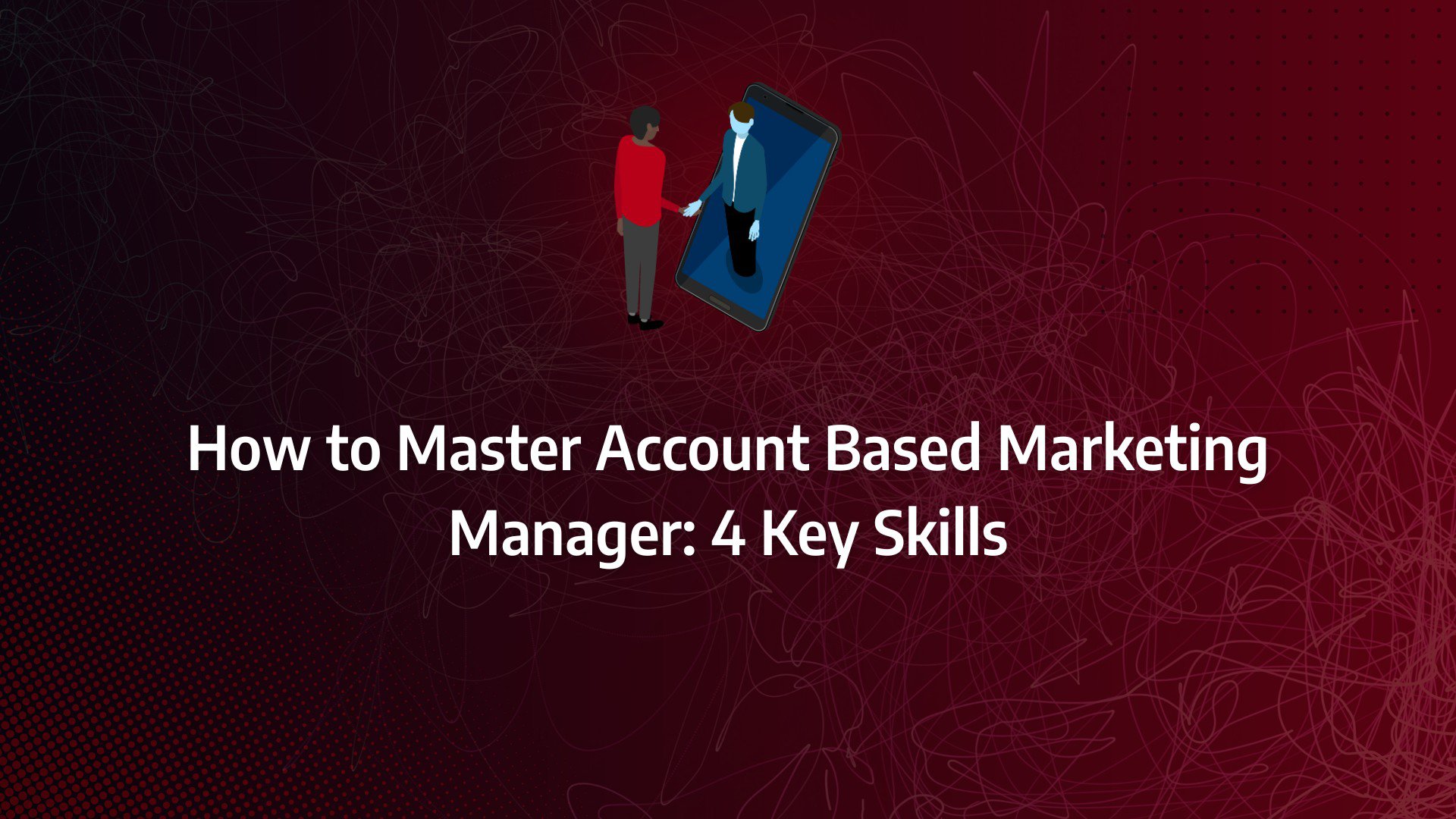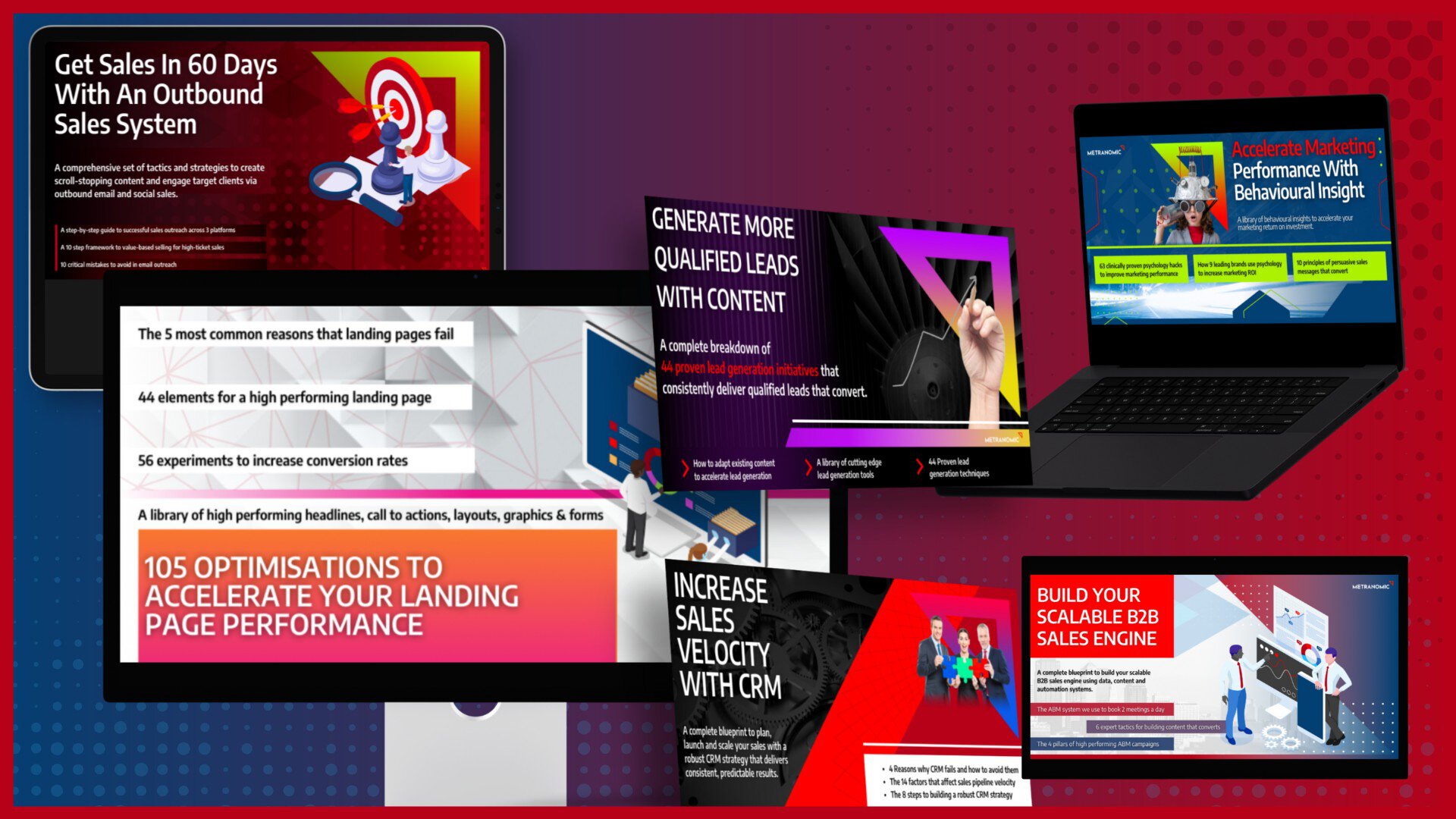Picture this: you’re tasked with spearheading the marketing efforts for your most high-value accounts, but without a clear roadmap, it can feel like navigating a maze. As an account-based marketing manager, your role isn’t just about casting a wide net—it’s about creating highly tailored strategies that resonate with the accounts that matter most.
To excel, you need more than just surface-level tactics; you need deep insights, seamless collaboration, and the ability to measure every move. In this guide, we’ll unpack the four critical skills every ABM manager must master to transform targeted accounts into long-term business wins.
- Tailored strategies are key: An ABM manager needs to craft highly customised plans that align with each account’s unique goals, ensuring maximum engagement and conversion.
- Account prioritisation matters: Focus on the accounts offering the highest revenue potential by using data-driven insights to target and nurture them effectively.
- Cross-functional collaboration is essential: Seamless coordination between marketing, sales, and customer success teams is critical to delivering a cohesive ABM campaign.
- Analytics drive success: Constantly analyse performance data to refine strategies and boost ROI for each account, ensuring continual improvement and optimisation.
- Mastering time management: With numerous tasks on your plate, staying organised and prioritising is crucial for meeting deadlines and delivering results on time.
Key Responsibilities of an ABM Manager
What Is an Account-Based Marketing Manager?
An account-based marketing manager is a specialised role responsible for orchestrating targeted marketing campaigns tailored to specific high-value accounts. Often referred to as an ABM specialist or digital marketing account manager, this role sits at the intersection of marketing and strategy, requiring seasoned professionals with advanced expertise. The account-based marketing manager focuses on identifying the most lucrative accounts within a company’s target audience, engaging these prospects, and nurturing relationships to secure long-term business growth.
In essence, an account-based marketing manager leads the charge in developing tailored account marketing strategies, continuously refining these strategies by analysing performance metrics and optimising campaign efforts to achieve the best results.
What does an account-based marketing manager do?
An account-based marketing manager is responsible for driving significant growth by executing highly targeted and personalised marketing strategies focused on high-value accounts. Below is a detailed overview of their core responsibilities:
- Developing Tailored ABM Strategies
A key responsibility is creating bespoke ABM plans. These strategies should be highly customised to resonate with specific accounts, ensuring that content and messaging are aligned to boost engagement and maximise conversion opportunities. - Identifying and Prioritising Key Accounts
The account-based marketing manager works closely with sales and customer success teams to identify the most lucrative accounts. By analysing data and market trends, they determine which accounts offer the highest revenue potential and prioritise these for targeted campaigns. - Collaborating Across Teams
Success in this role depends on seamless collaboration between various teams. The account-based marketing manager ensures that both sales and customer success departments are aligned with the marketing efforts, facilitating the creation of campaigns that directly address account-specific needs and pain points. - Leveraging Analytics for Performance Monitoring
The account-based marketing specialist is tasked with monitoring campaign effectiveness by using advanced analytics platforms. They track engagement and return on investment (ROI) for each account, reviewing performance data to refine ongoing campaigns and improve results.
Skills Required for an Account-Based Marketing Manager
An account-based marketing manager must possess a diverse set of skills to excel in their role. These include a mix of technical proficiencies (hard skills) and interpersonal abilities (soft skills), both of which are vital for the successful execution of ABM strategies. Below are some of the most crucial skills for anyone in account-based marketing roles:
- Task Orientation
In any account-based marketing manager role, you’ll be juggling multiple projects and tasks simultaneously. Prioritising tasks efficiently is crucial to ensure that campaigns are delivered on time and with precision. Strong task orientation skills enable ABM specialists to focus on what matters most at any given moment, driving productivity and successful outcomes. - Communication Skills
Effective communication is at the heart of an account-based marketing specialist’s success. Whether speaking or writing, the ability to clearly articulate ideas, relay information to team members, clients, and stakeholders, and manage expectations is essential. Strong communication ensures clarity, fosters collaboration, and facilitates seamless campaign execution. - Analytical Skills
To be an effective account-based marketing manager, you must excel in analysing reports, documents, and performance data. Analytical skills are key to understanding campaign performance, identifying areas for improvement, and optimising strategies based on insights. ABM specialists rely heavily on these skills to ensure data-driven decisions are made throughout each campaign. - Time Management
The ability to manage time effectively is critical for any marketing professional, but particularly for those in account-based marketing roles. Managing tight schedules, meetings, and deadlines requires meticulous planning and organisation to ensure tasks are completed efficiently without compromising quality. - Creativity
Creativity is an invaluable skill for an account-based marketing manager, enabling the development of innovative campaigns that capture attention and drive engagement. Creative thinking is essential for crafting persuasive messaging, developing unique value propositions, and standing out in a competitive marketplace.
Key Interview Questions for an Account-Based Marketing Manager Role
When evaluating candidates for an account-based marketing manager position, it’s crucial to ask questions that reveal their expertise and practical experience in ABM. Below are thoughtfully crafted interview questions to assess their suitability for the role:
- Tell us about your experience with Account-Based Marketing. How did you go about selecting and segmenting accounts?
This question seeks to understand the candidate’s depth of knowledge in ABM principles, particularly their approach to identifying and segmenting high-value accounts. - How have you previously aligned sales and marketing teams to achieve shared ABM goals?
Collaboration between sales and marketing is key to ABM success. This question is designed to explore the candidate’s ability to foster cross-functional alignment and ensure both teams are working towards common objectives. - Can you provide an example of a successful ABM campaign you’ve managed? What were the key results, and how did you measure its effectiveness?
By asking for a concrete example, this question delves into the candidate’s practical experience, strategic execution, and ability to measure campaign performance to demonstrate success.
How much do account based marketing managers make?
As of 1st October 2024, an account-based marketing manager in the United States earns an average salary of $80,142 annually. Compensation can vary based on the role type, with part-time or contract roles typically paid hourly or weekly. On average, this equates to approximately $39 per hour, $1,541 per week, or $6,678 per month, depending on the specifics of the role and the organisation.
What Matters Most?
From our experience with clients, one of the key strategic decisions in account-based marketing management is ensuring that ABM is deeply aligned with the organisation’s overarching goals. When ABM is directly connected to company-wide priorities, clients often discover that their marketing efforts deliver significantly higher ROI. Typically, we find that successful ABM programmes also prioritise deep personalisation, not just at the account level but throughout the customer journey, leveraging technologies to maintain scale without losing the human touch. Finally, effective ABM strategies require ongoing adaptation. By continuously refining target account selection and optimising engagement tactics based on real-time feedback, businesses can consistently drive growth, regardless of market fluctuations.Get In Touch
Essential Tools for an Account-Based Marketing Manager
Effective execution of account-based marketing (ABM) campaigns relies heavily on mastering a suite of powerful tools. These tools empower an account-based marketing manager to strategically target high-value accounts, personalise messaging, and measure performance with precision. Below is a breakdown of the key tools every account-based marketing specialist must master for successful campaign execution:
ABM Campaign Management Tools
These tools are the cornerstone for managing revenue teams, including sales, marketing, and customer success, enabling them to identify target accounts, launch campaigns, and track return on investment (ROI). They typically offer robust data capabilities for audience segmentation based on demographic insights and buying journey stages. However, a common limitation of these platforms is the manual work required to personalise content at scale.
- HubSpot
For companies not yet ready to invest in a comprehensive ABM platform, HubSpot offers a lighter solution. HubSpot’s marketing automation features allow for segmentation of audiences by creating Ideal Customer Profile (ICP) filters, which automatically tier prospects based on their relevance to your campaign. This platform is perfect for testing targeted campaigns before moving to a more advanced ABM system as results are measured. - 6sense
6sense’s Revenue AI platform is a gamechanger for parsing through buying signals and assigning intent scores, helping teams uncover new leads and pinpoint the best times and channels to engage them. The platform offers detailed recommendations on how to boost conversions through optimal messaging and channels. While the platform’s complexity may present a steep learning curve initially, its comprehensive customer support ensures a smooth onboarding process. - Terminus
Known for its robust native advertising channels, Terminus stands out by providing connectivity to over 100 different ad networks. It allows account-based marketing managers to fine-tune messaging across LinkedIn, websites, TV, and audio channels, making it particularly effective for retargeting efforts. Terminus also offers:- Ad Experiences: Ready-to-use ad templates tailored for diverse audience profiles.
- Chat Experience: Sales reps can initiate chat interactions with prospects at any time during their buyer journey.
- Email Signature Marketing: Enables personalisation of employee email signatures, embedding ads tailored to the recipient’s characteristics.
- Interactive Website Personalisation: Delivers personalised experiences through pop-ups and overlays on company websites.
ABM Content Personalisation Tools
Once target accounts have been segmented, the next step for an account-based marketing specialist is to deploy personalised content at scale. These tools simplify the creation and management of dynamic, hyper-targeted content, reducing the reliance on IT or web development teams.
- Hushly
Hushly excels at centralising existing content and recommending personalisation options based on prospect demographics. It offers several features to enhance personalisation:- Website Personalisation: Adjusts text, banners, and CTAs dynamically for specific audience segments.
- ABM Emails: Provides best-practice email templates and automated sequencing workflows to improve engagement and conversion.
- Uberflip
Uberflip stands out for its user-friendly interface and ability to centralise and organise content assets. It allows for large-scale content deployment, making it easy for marketers to execute campaigns without needing IT involvement. Uberflip also utilises AI to recommend the most relevant content for prospects, while enabling personalisation of key elements such as logos, messaging, and CTAs.
Sales Engagement Tools for Account-Based Marketing Managers
These tools are an indispensable part of the tech stack for an account-based marketing manager, enabling multichannel outreach, cadence management, and targeted sales activation.
Salesloft is a robust sales engagement platform designed to streamline communication between sales teams and prospects. It offers a unified workspace—known as the Modern Revenue Workspace™—where sellers can manage all aspects of digital selling. From engaging with buyers and executing tasks to accessing coaching and insights, Salesloft provides the tools necessary for improving sales performance. Although it has fewer features than some competitors, such as Outreach, many users find Salesloft’s intuitive interface easier to navigate, making it a favourite among those seeking simplicity and efficiency.
Outreach.io is another leading sales engagement platform, widely known for its extensive feature set. Outreach enables sales reps to engage prospects and customers across multiple channels, including email, phone, social media, and text. By leveraging automation and artificial intelligence, Outreach enhances the efficiency of go-to-market activities, making it a highly valuable tool for both sales and marketing teams. Over 5,500 companies, including high-profile names like Zoom and Siemens, rely on Outreach to manage their revenue cycle. While its broad functionality makes it a powerful option, some users note that integrating Outreach with existing systems can be more complex compared to other platforms.
Common Pitfalls Account-Based Marketing Managers Must Avoid
For an account-based marketing manager, navigating the complexities of ABM requires avoiding several common mistakes that can hinder campaign success. Below are the key pitfalls to watch out for, along with solutions to ensure a successful ABM strategy.
Mistake 1: Misinterpreting ABM as Lead Generation
One of the biggest misconceptions is treating ABM as just another form of lead generation. ABM isn’t about chasing as many leads as possible; it’s about fostering long-term, meaningful relationships with high-value accounts. The focus should be on deep engagement and building trust, not simply filling the funnel with numbers.
The Solution:
Shift your mindset from quantity to quality. ABM is about crafting personalised, strategic interactions that strengthen your relationships with key accounts over time. It’s crucial to concentrate on the unique needs and challenges of each account, tailoring your approach to deliver value at every stage.
Mistake 2: Incomplete Account Research
ABM is a highly strategic game, much like chess. Yet, many businesses dive into ABM campaigns without fully understanding the intricacies of their target accounts. Skipping detailed research means you’re likely to miss crucial insights that could make or break your campaign, resulting in poor engagement.
The Solution:
Thorough account research is non-negotiable. Use data analytics, market trends, and customer feedback to gain a deep understanding of each account’s pain points, challenges, and objectives. With this information, an account-based marketing specialist can develop personalised campaigns that resonate deeply, leading to higher engagement and conversion rates.
Mistake 3: Overlooking the Buyer Journey
ABM requires an in-depth understanding of the buyer journey, yet many companies fall into the trap of sending generic content to all prospects, regardless of their stage in the funnel. This approach often leads to disengagement, as prospects feel bombarded by irrelevant messages.
The Solution:
Map out the buyer journey for each account, identifying key touchpoints and decision-making moments. Tailor your messaging to address specific pain points at each stage of the journey. For instance, during the Learn stage, focus on educational content, while during the Compare stage, offer detailed comparisons of your solution to competitors. There are typically five stages to consider in the buyer journey:
- Learn: Recognising a potential problem
- Solve: Researching how to address the issue
- Compare: Evaluating different solutions
- Purchase: Making a final buying decision
- Loyalty: Feeling valued as a customer post-purchase
Mistake 4: Poor Coordination Between Sales and Marketing
Lack of coordination between sales and marketing teams is a frequent issue that can derail ABM campaigns. Traditional demand generation often sees marketing hand off leads to sales with minimal collaboration. In ABM, this siloed approach simply doesn’t work. Both teams must work closely, with constant communication and shared goals.
The Solution:
In ABM, there’s no “fence” between marketing and sales. Successful campaigns are built on tight collaboration, with both teams contributing to account-specific objectives. Ensure continuous communication and alignment between sales and marketing to avoid miscommunication and data silos. Track key performance indicators (KPIs) that measure the success of your combined efforts. These KPIs will help identify areas for improvement and ensure you’re achieving your shared objectives.
Best Practices for Building and Managing High-Performing ABM Teams
In today’s B2B marketing landscape, an account-based marketing manager must oversee the creation and management of a team that is both diverse in skill set and unified in its vision. The shift from targeting individual leads to focusing on high-value accounts has been transformative, but it also demands a highly strategic and coordinated approach. To succeed, an account-based marketing team must operate with precision, ensuring that all members align towards shared goals.
Our Tactical Recommendations
From our experience, aligning your ABM team closely with the sales function typically delivers quicker wins. Clients often find that a coordinated outreach plan across departments ensures no leads slip through the cracks. In addition, using intent data to inform decisions proves highly effective for identifying warm prospects and prioritising efforts, especially when combined with personalised playbooks tailored for each target account. We also recommend automating your ABM workflows, as clients who implement automation see a notable improvement in efficiency and the ability to scale faster without sacrificing the precision needed for high-value account targeting.Get In Touch
Understanding the Need for an Account-Based Marketing Team
The essence of account-based marketing (ABM) lies in its focus on personalised, targeted campaigns for high-value accounts. This necessitates a team that not only possesses diverse skills but also works in unison towards a single, strategic vision. A successful ABM team integrates various roles, each contributing to the creation of tailored marketing strategies that resonate deeply with specific accounts.
Key ABM Team Roles
- Senior Leadership: CMOs, CROs, and Marketing/Sales Directors
The senior leadership team plays a pivotal role in ABM, as they are responsible for forging inter-departmental cooperation and ensuring alignment at the highest level. It’s their job to communicate with other department heads, define overarching goals, and set the strategic direction for ABM initiatives. While they may not be involved in the day-to-day execution, they should stay informed about progress, KPIs, and how well interdepartmental efforts are functioning. - Operations Managers
At the operational core of ABM lies martech. An effective account-based marketing manager knows that their customer relationship management (CRM) platform is the beating heart of any ABM strategy. This platform is supplemented by automation and analytics tools, which means operations managers are tasked with overseeing multiple moving parts. Their responsibility is to ensure all systems run seamlessly, tracking performance and optimising processes along the way. - Content Specialists
Content creation is integral to ABM success, and your content specialists are the ones tasked with producing highly personalised, targeted content for your high-value accounts. These team members continuously analyse account behaviour, crafting bespoke content that meets specific needs. This role also involves working closely with sales representatives, as content specialists help nurture leads and create sales enablement materials. Their work is never static—they must regularly iterate on everything from email subject lines to overarching content strategies, ensuring that content evolves in line with account demands. - Channel Experts
ABM requires precision not just in content but in its delivery. Channel experts ensure that the right message reaches the right audience via the most effective channels. This could involve identifying the social media platforms favoured by target accounts, analysing their responsiveness to email, or determining which online press they follow. In some cases, it might even mean exploring traditional avenues like events, trade publications, and other offline channels to connect with key decision-makers. - Sales Leaders
Without close collaboration between sales and marketing, ABM would not be possible. Sales leaders are integral to ABM teams, not only because they close deals but because they offer critical insights into what materials and support they need from marketing to succeed. In this role, sales leaders drive revenue by selling to both prospective and existing accounts while working hand-in-hand with marketing to ensure that ABM campaigns meet the specific needs of each account.
Core Skills Required for a High-Performance ABM Team
For an account-based marketing manager to lead a high-performing ABM team, a blend of strategic, technical, and creative skills is essential. The following skills ensure that an ABM team can craft and execute campaigns that resonate deeply with high-value accounts, delivering measurable results.
1. Strategic Thinking
At the heart of every successful account-based marketing manager role is strategic thinking. ABM teams must always keep the broader business objectives in mind, understanding the long-term goals of the organisation and aligning their campaigns accordingly. This involves setting clear, measurable targets, identifying high-value accounts, and devising personalised campaigns that meet the specific challenges of each target. Strategic thinkers understand that ABM is not just about individual campaigns but about building long-term relationships with key accounts.
2. Data Analysis and Interpretation
ABM is data-driven by nature, and the ability to analyse and interpret complex datasets is vital. For an account-based marketing specialist, proficiency in using CRM systems, analytics platforms, and data visualisation tools is essential. These tools help teams identify target accounts, assess their pain points, and tailor marketing messages that speak directly to their needs. Data analysis ensures that decisions are based on actionable insights, making marketing efforts far more effective and efficient.
3. Content Creation and Personalisation
In ABM, content is the primary vehicle for delivering your message, but it’s not just about producing any content—it’s about creating personalised, highly relevant content that speaks directly to the unique needs of each account. The ability to craft compelling narratives, design visually engaging materials, and tailor messaging to specific audiences is a must-have skill. Account-based marketing managers and their teams must have a deep understanding of their target accounts’ industries, challenges, and goals to ensure their content hits the mark.
4. Project Management
Managing ABM campaigns often means juggling multiple moving parts. From campaign timelines to various deliverables and KPIs, strong project management skills are necessary to keep everything on track. Effective project management ensures that campaigns are delivered on time, within budget, and with the highest quality. It requires planning, coordination, and the ability to manage resources efficiently to meet the specific demands of each account.







